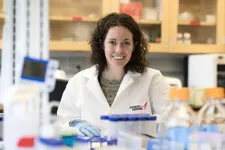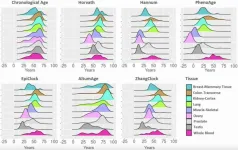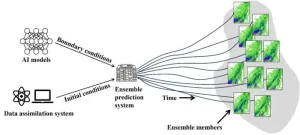(Press-News.org) An increase in high-fat, high-fructose foods in people’s diets has contributed to a dramatic increase in type 2 diabetes. This, in turn, has led to an increase in peripheral neuropathy — nerve damage, typically in the hands and feet — that causes weakness, loss of sensation and, in some, a stabbing, burning, or tingling pain. About half of people with type 2 diabetes are affected, and of these, about half experience severe neuropathic pain.
The damage begins as axons from sensory neurons begin to retract and disappear from the tissues they innervate. New research from the lab of Clifford Woolf, MB, BCh, PhD, director of the F.M. Kirby Neurobiology Center at Boston Children’s Hospital, reveals that months before the damage occurs, immune cells flood into peripheral nerves in an apparent attempt to protect them. This surprising insight, published in Nature, could lead to strategies to prevent peripheral neuropathy or at least minimize and slow the onset of the damage.
Immune cells prevent nerve damage
A team led by Sara Hakim, PhD, a graduate student in the lab, created a mouse model of diabetes induced by a high-fat, high-fructose diet. The model showed that these mice developed all the major features of diabetes within eight to 12 weeks of starting the diet. At about 6 months, axons in the skin began to degenerate, indicating the presence of neuropathy.
"Diabetic neuropathy takes years, or even decades to develop in humans,” says Hakim, who is now at Vertex. “By using a mouse model in which symptoms slowly develop over months, we were able to catch the progression of the disease over time, and observe those early protective responses when the body is still trying to fight the disease."
The researchers suspected that peripheral neuropathy is caused by the immune system, so used single-cell sequencing to detect changes in immune cells near sensory neuron axons in peripheral nerves.
One type of immune cell residing in nerves, a pro-inflammatory macrophage, began producing chemokines. These signaling molecules recruited a second population of circulating macrophages, which began infiltrating the nerve 12 weeks after the mice began the diet — as sensory symptoms were starting to appear but before nerve degeneration was seen.
Previously, macrophages were thought to have a pathogenic role in diabetes and were mainly reacting to axon loss. But Hakim, Woolf, and colleagues observed just the opposite.
“To our great surprise, when we blocked infiltration of macrophages into the nerve, neuropathy started getting worse, not better,” says Woolf. “The macrophages were protective. They slowed down the onset of neuropathy and reduced its impact.”
Potential strategies for peripheral neuropathy
The Woolf Lab is now exploring how the infiltrating macrophages protect against peripheral neuropathy. The next step would be to find a way to induce and sustain this protection and identify biomarkers that would flag those people with diabetes who are at risk.
One potential protective strategy might involve accelerating the recruitment of macrophages into nerves; another might involve mimicking their protective function by harnessing compounds they secrete, such as galectin 3.
“Since we could profile the cells and identify what genes they are expressing, we found a number of signaling molecules known to be protective,” says Woolf. “We can now go through that list and check to see which are most active.”
The latest work reinforces the idea that pain isn’t just a disease of neurons, but results from interactions between the nervous system and the immune system. In a study last year, the Woolf Lab discovered thousands of molecular interactions between pain-sensing neurons and different types of immune cells.
Now, the plot is thickening with this example of immune cells acting to prevent painful nerve damage. “We’ve now revealed a novel, slower protective effect of the immune system,” Woolf says.
END
Could peripheral neuropathy be stopped before it starts?
New research finds that macrophages play a protective role in trying to prevent neuropathy from developing, suggesting a new pathway to target
2025-02-12
ELSE PRESS RELEASES FROM THIS DATE:
China Jurassic fossil discovery sheds light on bird origin
2025-02-12
A research team led by Professor WANG Min from the Institute of Vertebrate Paleontology and Paleoanthropology (IVPP) of the Chinese Academy of Sciences has discovered two bird fossils in Jurassic-era rocks from Fujian Province in southeast China. These rocks date back approximately 149 million years. The fossils fill a spatiotemporal gap in the early evolutionary history of birds and provide the evidence yet that birds were diversified by the end of the Jurassic period.
This study was published in Nature.
Birds ...
Long-term yogurt consumption tied to decreased incidence of certain types of colorectal cancer
2025-02-12
Yogurt, which contains live strains of bacteria, is thought to protect against many types of diseases, with some reports indicating it could reduce risk of colorectal cancer. A new study led by investigators from Mass General Brigham finds that yogurt consumption over time may protect against colorectal cancer through changes in the gut microbiome. Using data from studies that have followed participants for decades, researchers found that long-term consumption of two or more servings per week of yogurt was tied to lower rates of proximal colorectal cancer positive ...
Ovarian cancer discovery could turn failed treatment into lifesaver
2025-02-12
University of Virginia Cancer Center researchers have explained the failure of immune checkpoint therapy for ovarian cancer by discovering how gut bacteria interfere with the treatment. Doctors may be able to use the findings to overcome this treatment failure and save the lives of thousands of women every year.
The new discovery, from the lab of UVA’s Melanie Rutkowski, PhD, speaks to the surprising ways that the microbiome – the collection of organisms that live on and inside our bodies – is vital not only to ...
DNA methylation clocks may require tissue-specific adjustments for accurate aging estimates
2025-02-12
“Our results suggest that forensic applications of DNAm clocks using non-blood tissue types will provide age estimates that are not as accurate as predictions based on blood, especially if using clocks algorithms trained on blood samples.”
BUFFALO, NY—February 12, 2025 — A new research paper was published in Aging (Aging-US) on January 3, 2025, in Volume 17, Issue 1, titled “Characterization of DNA methylation clock algorithms applied to diverse tissue types.”
Researchers ...
Tidal energy measurements help SwRI scientists understand Titan’s composition, orbital history
2025-02-12
SAN ANTONIO — February 12, 2025 —Southwest Research Institute (SwRI) scientists are studying Saturn’s moon Titan to assess its tidal dissipation rate, the energy lost as it orbits the ringed planet with its massive gravitational force. Understanding tidal dissipation helps scientists infer many other things about Titan, such as the makeup of its inner core and its orbital history.
“When most people think of tides they think of the movement of the oceans, in and out, with the passage of the Moon overhead, said Dr. Brynna Downey. “But that is just because water moves ...
Data-driven networks influence convective-scale ensemble weather forecasts
2025-02-12
To effectively present the uncertainty of convective-scale weather forecasts, convective-scale ensemble prediction systems have been developed at major operational centers, whose lateral boundary conditions are usually provided by global numerical weather models. Recently, the emergence of AI weather models has provided a new approach to driving convective-scale ensemble prediction systems. AI weather models can produce forecasts for the next 7 to 10 days in just a few minutes, which is around 10,000 times faster than numerical weather models. However, the performance of using the ...
Endocrine Society awards Baxter Prize to innovator in endocrine cancer drug discovery
2025-02-12
WASHINGTON—Donald Patrick McDonnell, Ph.D., has been awarded the Endocrine Society’s John D. Baxter Prize for Entrepreneurship for discovering hormone therapies for treating breast and prostate cancer, the Society announced today.
The John D. Baxter Prize for Entrepreneurship was established to recognize the extraordinary achievement of bringing an idea, product, service, or process to market. This work ultimately elevates the field of endocrinology and positively impacts the health of patients.
McDonnell is a professor at Duke University School ...
Companies quietly switching out toxic product ingredients in response to California law
2025-02-12
A new study by Silent Spring Institute and University of California, Berkeley shows how laws that promote greater transparency around harmful chemicals in products can shift markets toward safer products.
The study, published in the journal Environmental Science & Technology, focused on California’s right-to-know law called Proposition 65, or Prop 65. Under the law, the state of California maintains a list of approximately 900 chemicals known to cause cancer, birth defects, or reproductive harm. Companies that sell products in California are required to warn people if their products could expose them to harmful ...
Can math save content creators? A new model proposes fairer revenue distribution methods for streaming services
2025-02-12
As more consumers turn to subscription-based platforms, the distribution of revenue in streaming services has become a crucial issue in the digital economy. Content creators and artists argue that the current models are opaque, frequently neglecting the needs of creators. In response, researchers at UMH have proposed a model based on three allocation rules that could be applied according to various fairness criteria.
"Our model is based on three main approaches: the equal division rule, which divides revenue equally among services; the proportional rule, which allocates revenue according ...
Study examines grief of zoo employees and volunteers across the US after animal losses
2025-02-12
A collaboration of researchers from Colorado State University and Denver Zoo Conservation Alliance surveyed zoo employees and volunteers across the US about their experiences of burnout and grief related to zoo animal losses.
Their latest study has found that poor grief support in some US zoos leaves staff feeling limited empathy from leadership, burned out, and unable to openly express their grief after the death of an animal to which they had formed a close emotional bond.
The research, published in the journal ...
LAST 30 PRESS RELEASES:
National Reactor Innovation Center opens Molten Salt Thermophysical Examination Capability at INL
International Progressive MS Alliance awards €6.9 million to three studies researching therapies to address common symptoms of progressive MS
Can your soil’s color predict its health?
Biochar nanomaterials could transform medicine, energy, and climate solutions
Turning waste into power: scientists convert discarded phone batteries and industrial lignin into high-performance sodium battery materials
PhD student maps mysterious upper atmosphere of Uranus for the first time
Idaho National Laboratory to accelerate nuclear energy deployment with NVIDIA AI through the Genesis Mission
Blood test could help guide treatment decisions in germ cell tumors
New ‘scimitar-crested’ Spinosaurus species discovered in the central Sahara
“Cyborg” pancreatic organoids can monitor the maturation of islet cells
Technique to extract concepts from AI models can help steer and monitor model outputs
Study clarifies the cancer genome in domestic cats
Crested Spinosaurus fossil was aquatic, but lived 1,000 kilometers from the Tethys Sea
MULTI-evolve: Rapid evolution of complex multi-mutant proteins
A new method to steer AI output uncovers vulnerabilities and potential improvements
Why some objects in space look like snowmen
Flickering glacial climate may have shaped early human evolution
First AHA/ACC acute pulmonary embolism guideline: prompt diagnosis and treatment are key
Could “cyborg” transplants replace pancreatic tissue damaged by diabetes?
Hearing a molecule’s solo performance
Justice after trauma? Race, red tape keep sexual assault victims from compensation
Columbia researchers awarded ARPA-H funding to speed diagnosis of lymphatic disorders
James R. Downing, MD, to step down as president and CEO of St. Jude Children’s Research Hospital in late 2026
A remote-controlled CAR-T for safer immunotherapy
UT College of Veterinary Medicine dean elected Fellow of the American Academy of Microbiology
AERA selects 34 exemplary scholars as 2026 Fellows
Similar kinases play distinct roles in the brain
New research takes first step toward advance warnings of space weather
Scientists unlock a massive new ‘color palette’ for biomedical research by synthesizing non-natural amino acids
Brain cells drive endurance gains after exercise
[Press-News.org] Could peripheral neuropathy be stopped before it starts?New research finds that macrophages play a protective role in trying to prevent neuropathy from developing, suggesting a new pathway to target




